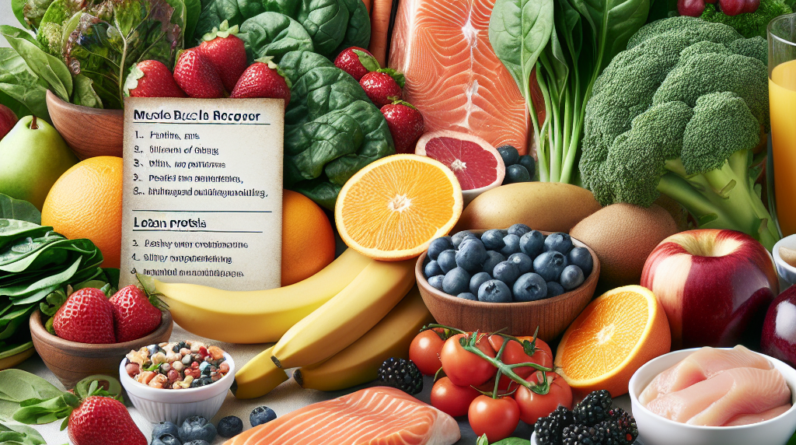
Hey there, fellow fitness enthusiasts! As someone who’s spent countless hours in the gym, I’ve learned a thing or two about how to fuel my body after a tough workout. Muscle recovery is key to making gains and keeping your body in tip-top shape. So, let’s dive into the best foods that can help your muscles recover effectively!
Get a Huge Discount and Bonus! Try for 90 Days Risk Free
Protein-Packed Foods
Understanding Protein Needs
We all know that protein is crucial for muscle repair. After all, your muscles are made of protein fibers, and breaking them down during workouts means we need to rebuild them afterward. From my experience, I aim for around 20-30 grams of protein in my post-workout meal. This amount helps kickstart the recovery process.
What’s great about protein is that it comes in many forms. Whether you’re a meat eater or prefer plant-based options, you can still hit those protein goals. Chicken, turkey, fish, and even tofu or legumes are awesome picks to mix things up.
In addition, consider protein shakes if you’re on the go. They’re convenient, tasty, and give you that quick burst of recovery power right after your workout. Just don’t forget to check the ingredients—some can pack in unwanted sugars!
Best Sources of Protein
If you want to know which foods are my go-to’s, here they are! Chicken breasts have been my best buddy post-gym. They’re lean, easy to cook, and I can pair them with veggies for a wholesome meal.
Then we’ve got eggs. Packed with high-quality protein and vitamins, they’re perfect for breakfast or even a post-workout omelet. Just remember the yolks contain healthy fats that are great for overall health.
Don’t forget about fish! Salmon is loaded with omega-3 fatty acids, which help reduce inflammation. Personally, I like to grill salmon with a side of quinoa for a filling dinner that assists my recovery.
Timing Your Protein Intake
Many of us hear about the importance of the “anabolic window,” which is that time post-exercise when your muscles are most receptive to nutrients. I always recommend consuming protein within 30 minutes of your workout. This isn’t just a myth; it really makes a difference!
Try planning your meals or snacks accordingly. If you know you’re hitting the gym after work, prepare a protein-rich snack to have right after your sweat session. It can be as simple as a Greek yogurt or a protein bar.
Get a Huge Discount and Bonus! Try for 90 Days Risk Free
Remember, it’s not just about eating protein; the quality of your protein matters! Whole food sources can provide additional nutrients that support recovery, plus are generally more beneficial in the long run.
Carbohydrates for Energy Restoration
The Role of Carbs
Alright, let’s chat about carbs. I know, I know! Carbs can get a bad rap, but they’re essential for replenishing glycogen stores in your muscles after a workout. Without proper carbohydrate intake, I can feel my energy dipping.
When I’m reaching for carbs post-workout, I look for complex carbohydrates like brown rice, whole grain bread, or sweet potatoes. They’re slowly digested and will give you sustained energy throughout the day.
Sugar can be okay sometimes too, especially if you’ve had an intense workout. Just a little bit can help kickstart recovery, but I always stick with natural sources, like a banana or dried fruits, over candy bars!
Need a Serious Energy BOOST? Huge Discount Try for 90 Days Risk Free
Choosing the Right Carbs
There are tons of choices when it comes to post-workout carbs, but I’m all about balance. Pairing my protein with complex carbs is a strategy I swear by. For example, having grilled chicken with quinoa or a hearty salad with chickpeas always hits the spot.
Fruits are also a great addition. They offer vitamins and minerals that assist with recovery, not to mention they’re refreshing! Berries, oranges, and even apples are fantastic quick snacks.
And let’s not forget about smoothies! I love blending up spinach, a banana, protein powder, and some oats for the ultimate recovery drink. It’s quick, tasty, and super nutritious!
Timing Your Carb Intake
Timing your carbs can be just as crucial as timing your protein. My routine usually involves a balanced meal that includes both protein and carbs within an hour after exercising. You’ll want to maximize those nutrient benefits!
If I’m in a rush, I keep some high-carb snacks handy. Granola bars and fruit are my go-to’s. It’s all about keeping your body fueled so you can recover and be ready for the next workout.
Experiment a little to find what works best for you when it comes to food timing. Everyone’s body is different, and honing in on what feels right is part of the journey!
Healthy Fats
The Importance of Fats
I’m sure when some people hear “fats,” they worry about their waistlines. But fats are incredibly important for overall recovery and health! They help with hormone production, nutrient absorption, and even provide energy during workouts.
Healthy fats, like those found in avocados, nuts, and olive oil, are my favorites. They provide essential fatty acids that help fight inflammation and support overall muscle recovery.
When I prepare meals, I always try to include a source of healthy fat. Even adding a drizzle of olive oil over my salads or incorporating nuts into my dishes not only enhances flavor, but it’s good nutrition too!
Good Health Solution is Easier Than Most People Think!
Take a Look for Yourself!
Sources of Healthy Fats
So what are my top choices? I’d definitely say avocados are a star player! They’re versatile—throw them in smoothies, salads, or simply mash them onto whole wheat toast.
Nuts and seeds are also powerful little snacks. Whether I’m munching on almonds or sprinkling chia seeds in my oats, they’re packed with nutrients and can help keep me feeling full longer.
Another favorite is fatty fish like mackerel or sardines. They’re full of omega-3s and not only are they delicious, but they do wonders for muscle recovery. It’s a win-win!
Balancing Fats with Other Nutrients
Even though fats are important, maintaining balance is key. It’s essential not to overdo it since fats are calorie-dense. I always recommend including healthy fats in moderation while keeping an eye on protein and carbs as well.
Try to create meals where fats can complement your proteins and carbs. For instance, a hearty quinoa salad topped with chickpeas, avocado, and spinach is not only tasty but also nutritionally balanced.
Listening to your body is essential. If you notice you’re feeling sluggish after meals, you might want to reevaluate your fat intake. It’s all about understanding how you feel and adjusting accordingly!
Hydration for Recovery
The Importance of Staying Hydrated
When it comes to recovery, hydration is often overlooked. I can’t stress enough how important it is to drink water before, during, and after your workout. Proper hydration helps with muscle soreness and fatigue, keeping everything functioning smoothly.
After sweating it out, my go-to drink is water, but sometimes I add in electrolyte-rich beverages. Things like coconut water or sports drinks can replace fluids lost during intense workouts, especially in the sweltering summer heat!
Listening to your body is vital here. If you’re feeling thirsty during exercise, it means you’re already a bit dehydrated. So, keep that water bottle close and take sips throughout your workout!
Knowing How Much to Drink
Okay, so how much water do we actually need? A good rule of thumb is to aim for around half your body weight in ounces daily. For example, if you weigh 150 pounds, you’d drink about 75 ounces of water each day.
After workouts, I usually weigh myself to check for fluid loss. A drop in weight can indicate I need to refuel with water. Also, consider the color of your urine—light yellow is perfect, while a dark color is a sign to drink up!
Setting reminders on your phone or using a fun water bottle can help too. I’ve found that when I consciously make an effort to drink water, I feel way better and more energized!
Hydration Foods
Did you know that certain foods can also help with hydration? Foods with high water content can give your body that extra boost. Watermelon, cucumber, oranges, and strawberries are some of my favorites.
I often include these in my meals. For instance, a refreshing salad with cucumber and oranges is not only hydrating but tasty too! Plus, they’re packed with vitamins and minerals that complement recovery.
Incorporating soups or broths into meals also helps with hydration. A warm bowl of vegetable soup not only feels comforting after a workout but counts towards your fluid intake!
FAQs about Best Foods for Muscle Recovery
1. What is the most important food for muscle recovery?
Protein is key for muscle recovery. It helps repair the tears in muscle fibers that occur during workouts. Pairing protein with carbohydrates will also aid in replenishing your energy stores!
2. How soon should I eat after a workout?
It’s best to eat within 30 minutes to 2 hours post-workout. This is when your muscles are primed to take in nutrients for recovery. A meal or snack that includes protein and carbohydrates works best!
3. Can I just drink protein shakes for recovery?
While protein shakes are convenient and can be beneficial, it’s crucial to have a variety of whole foods in your diet as well. Whole foods provide additional nutrients that shakes may lack.
4. How much water should I drink during recovery?
A good starting point is to aim for around half your body weight in ounces of water daily. After workouts, drink water to replenish what you lost through sweat.
5. Are there any foods to avoid for better recovery?
Yes, it’s best to avoid processed foods high in sugar and unhealthy fats. They can lead to inflammation and hinder recovery. Focus on whole, nutrient-dense foods for the best results!
So there you have it! Some of my top tips on the best foods for muscle recovery. Remember, it’s about listening to your body and experimenting to find out what works best for you. Happy recovering!








